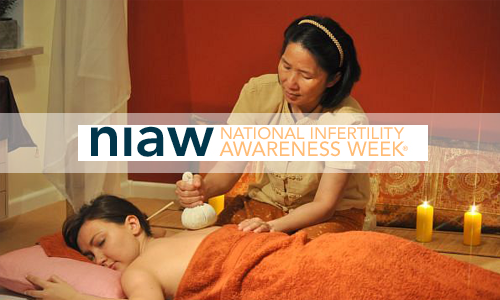Today’s post for National Infertility Awareness Week focuses on the value and importance of the mind-body connection with regards to infertility. Leslee Kagan, MS, FNP-BC, from the Benson-Henry Institute for Mind Body Medicine at Massachusetts General Hospital shares her insights with us today.

Infertility is a common challenge estimated to affect over 7 million women and their partners in the United States each year. The stress associated with infertility often leads to a heightened experience of negative emotions and reactivity. However, as with any stressor, when the challenge is met successfully, resilience is enhanced.
The question then becomes, how can one successfully meet the stress or challenges associated with infertility?
First, it is helpful to understand the physiology of stress. Whenever we perceive a threat, either real or imagined, the brain signals the body to activate the stress response. The result of this is a cascade of metabolic changes that lead to a wearing down of the body’s limited resources and a depletion of the body’s energy, which in turn can adversely affect the body’s regulatory mechanisms for mood, motivation, energy, sleep, muscle tension and blood pressure. From a simple thought or perception of threat, the mind has influenced the body. This is a ‘mind body’ interaction.
Mind body medicine is an evidence-based field that draws from many scientific disciplines, including modern medicine, psychology, neuroscience, genomics, nutrition, and exercise physiology. The goal is to enhance the body’s natural healing capacities. Mind body medicine does not devalue conventional medicine, pharmacology or surgery, but rather, it adopts the perspective that health is optimized when mind body approaches are used in combination with conventional medicine. Although the benefits of mind body medicine have only recently been recognized by Western medicine, it has been practiced for thousands of years across the world in the form of meditation, yoga and prayer.
Building on this tradition, the good news is that there are a variety of ways to gain control over one’s thoughts and perceptions to buffer or contain the stress response. These include:
- meditation methods that elicit the relaxation response (RR)
- increasing expression of positive thoughts and attitudes
- getting adequate or restorative sleep
- physical activity
- healthy diet and mindful eating
- improved social support
- increased awareness of how stress can negatively impact thoughts and feelings
The relationship between stress and infertility is complex and not completely understood. It is not surprising that multiple studies have shown that stress is prevalent in women who have been diagnosed with infertility; this is supported by a 2011 study by Greil and colleagues, which cites significant psychological distress in women and couples trying to conceive. If one thinks of this in terms of resilience and mind body interactions, a 2012 study found that women with a diagnosis of infertility perceived themselves to have less control over their health, and therefore their coping strategies were compromised (Gourouti, et al., 2012). Thus, a mind body approach, which is designed to teach skills that enhance coping and foster a sense of control, can act to buffer the stress associated with infertility.
Studies support this notion. Dr. Alice Domar and colleagues have demonstrated that a mind body approach is effective in reducing psychological distress, as well as enhancing pregnancy results (2000; 2011). A study by Chan and colleagues (2006) showed that a mind body spirit program led to decreased anxiety. A recent pilot study conducted by the Benson-Henry Institute (BHI) at Massachusetts General Hospital (MGH) and the MGH Fertility Center assessed resiliency in women after participating in a mind body program. Participants in the study experienced increased optimism and social support as well as reduced perceived stress and depressive symptoms… measures of meeting more successfully the challenges of infertility.
Looking to the future, research is focused on better understanding the physiology of mind body medicine… even at a cellular level. In 2008, BHI released the first study to provide compelling evidence that mind body approaches, specifically the RR, elicit specific gene expression changes (i.e., how genes are turned on and off). These changes in gene expression resulting from RR may relate to long term physiological effects that promote health and resilience. Future research is needed to better understand these complex relationships, however it is becoming increasingly clear that the mind has a powerful effect on the body.
About the Author
Leslee Kagan, MS, FNP-BC, is Director of Women’s Health and Co-Director of the Relaxation Response Resiliency Program at the Benson-Henry Institute for Mind Body Medicine at Massachusetts General Hospital. In these roles, she leads several focused clinical programs including the Mind Body Program for Health and Fertility and the Mind Body Program for Women, and the Relaxation Response Resiliency Program (3RP). Ms. Kagan is also actively involved in research, and is a contributing investigator in several ongoing research initiatives. After earning her BA degree in French and Spanish from the State University of New York at Stony Brook, Ms. Kagan transitioned to a career in healthcare, earning the MSN and FNP degrees that would enable her to follow her interest in applying mind body techniques to all aspects of women’s health. Ms. Kagan joined the BHI in 1998 and has developed a loyal following among her colleagues, patients and members of the mind body medicine community.
